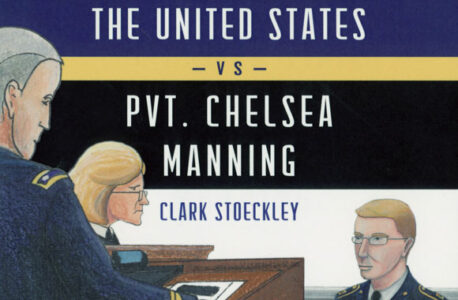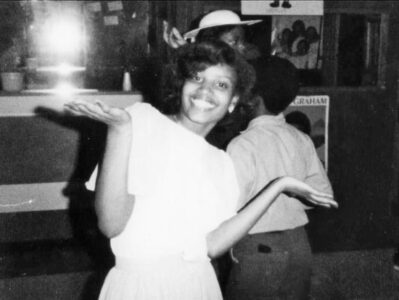The graphic novel might not be the first format that comes to mind in recounting a historical trial, but it works remarkably well in The United States vs. Private Chelsea Manning. Activist and artist Clark Stoeckley attended many of the proceedings which took place in Fort Meade, Maryland and uses unofficial transcribed testimony (the official records are not available to the public) for much of the text.
The book opens on December 16, 2011 at a pretrial hearing and introduces us to Manning’s lead defense lawyer, David Coombs. It continues chronologically as the judge makes rulings and various witnesses and experts are brought to the stand. Stoeckley integrates scenes from within the courtroom with other visuals such as drawings derived from the so-called ‘Collateral Murder’ video, which was released by WikiLeaks, and shows U.S. forces shooting at children and then killing two Reuters journalists in an incident in Iraq.
Aside from the visual aspect of the book, the book is driven by the testimony which sheds light on issues about the journalistic nature of WikiLeaks, Manning’s mental state, and the affect of the released documents on national security. There is more text than many other graphic novels have, with stretches of dialogue and statements as well as explanations of legalese. Manning’s testimony is especially telling since his public statements were so limited. He (I refer to Manning as ‘he’ until the official statement about his gender transition, which is not until after the trial) speaks about being held in confinement, deployment to Iraq, and his reasoning for exposing the documents. Manning says, “I wanted the American public to know that not everyone in Iraq and Afghanistan are targets to neutralize, but rather people struggling to live in the pressure cooker environment of what we call asymmetric warfare.”
Through the text and the drawings, Stoeckley manages to capture both the prosecution and the defense’s arguments and the varied aspects of the trial (ranging from documents about Guantanamo to Manning’s troubled family life). The book ends with the verdict and Manning’s announcement that she will live as a woman. She is currently serving a 35 year sentence in a federal prison and is in the process of bringing an appeal.






